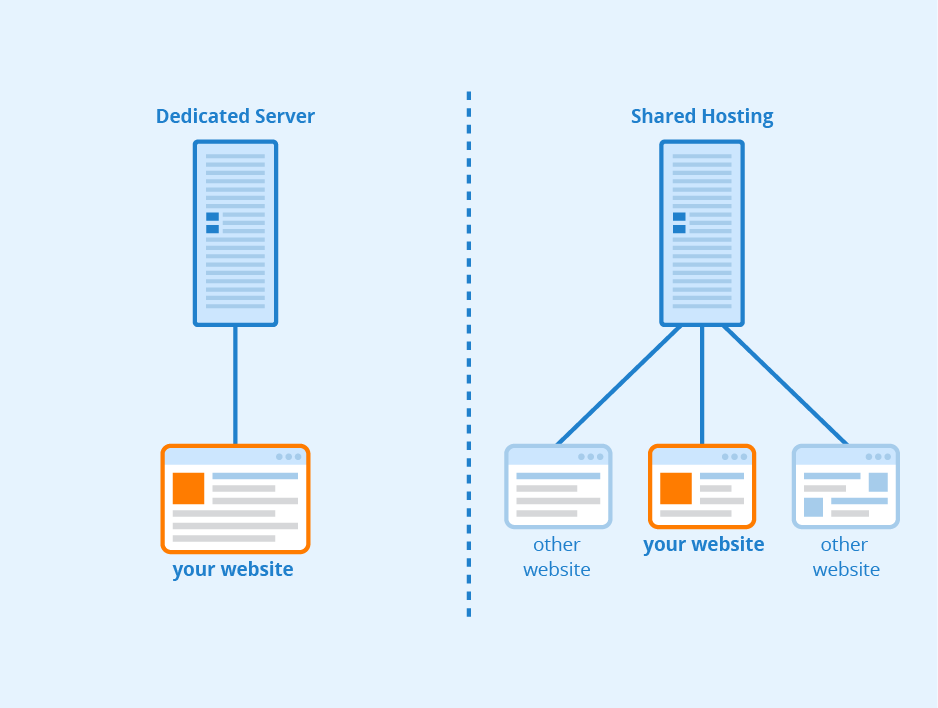1. What Is Shared Hosting?
Shared hosting is like renting an apartment where you share the building with multiple other tenants. You split resources like bandwidth, disk space, and RAM with numerous other websites on the same server. The server itself is maintained by a hosting company, which takes care of all the technical aspects, such as updates and security patches.
Advantages of Shared Hosting:
- Affordability: Shared hosting is usually the most budget-friendly option, making it ideal for beginners or personal projects.
- Ease of Use: Most hosting providers offer easy-to-use control panels like cPanel, which makes website management simple.
- Maintenance-Free: The hosting company takes care of all server-related tasks, so you don’t need any technical knowledge.
Disadvantages of Shared Hosting:
- Limited Resources: Since you’re sharing resources with other websites, your site’s performance can suffer if one of your server neighbors experiences a traffic spike.
- Lack of Customization: You don’t have root access to the server, limiting your ability to customize settings or install specific software.
- Potential for Downtime: High traffic on other websites hosted on the same server can slow down or even crash your site.
Video guide for Shared Hosting:

2. What Is VPS Hosting?
VPS, or Virtual Private Server hosting, offers more privacy and control. It’s like renting a condo—while you’re still sharing the building, you have your own dedicated space and resources. A physical server is split into multiple virtual environments, and each VPS operates independently. You get dedicated resources like CPU, RAM, and storage that are isolated from other users.
Advantages of VPS Hosting:
- Better Performance: With dedicated resources, your site won’t be affected by the performance of other websites.
- More Control: VPS gives you root access, allowing for customization and the installation of specific software and scripts.
- Scalability: VPS hosting is highly scalable, meaning you can increase your resources as your website grows.
Disadvantages of VPS Hosting:
- Higher Cost: VPS hosting is generally more expensive than shared hosting.
- Technical Knowledge Required: While some hosting providers offer managed VPS services, you’ll often need a basic understanding of server management.
3. Who Should Use Shared Hosting?
Shared hosting is an excellent option for:
- Beginners: If this is your first website, shared hosting is a safe and affordable choice.
- Small Blogs and Personal Sites: For websites that won’t receive a lot of traffic, shared hosting is usually sufficient.
- Tight Budgets: If you need to keep costs low, shared hosting can provide the necessary infrastructure without breaking the bank.
Example:
Imagine you’re starting a travel blog. In the beginning, you won’t have thousands of visitors per day. Shared hosting will give you what you need to get started without a hefty financial commitment.

4. Who Should Use VPS Hosting?
VPS hosting is suitable for:
- Growing Businesses: If your website is scaling up and you need more control over your server environment, VPS is the logical next step.
- E-commerce Sites: Websites that handle sensitive information, like online stores, benefit from the added security and performance of VPS.
- High-Traffic Websites: If your site receives substantial traffic or experiences frequent traffic spikes, VPS ensures better uptime and speed.
Example:
Say you’re running an online store. Your sales and traffic are steadily growing, and the increased demand is slowing down your site. Upgrading to VPS hosting can help keep things running smoothly and securely.

5. Performance: Shared vs. VPS Hosting
When it comes to performance, VPS hosting is the clear winner. With shared hosting, you’re always at the mercy of other websites on the server. If one of your neighbors gets a surge in traffic, it can slow down your site.
In contrast, VPS hosting provides dedicated resources, ensuring consistent performance even during high traffic periods.
Shared Hosting Performance:
- Suitable for websites with low to moderate traffic.
- Can experience slowdowns during peak times.
VPS Hosting Performance:
- Excellent for websites that require more consistent speed and uptime.
- Ideal for handling traffic spikes without sacrificing performance.
6. Security: Shared vs. VPS Hosting
Security is another area where VPS hosting pulls ahead. In a shared hosting environment, if one website on the server gets hacked or infected with malware, there’s a higher risk that your website could also be compromised. Although hosting providers take precautions, shared hosting environments are naturally more vulnerable.
With VPS hosting, you’re isolated from other users on the server, which reduces your risk of falling victim to the problems of your server neighbors. Additionally, VPS gives you more control over your security settings and the ability to install custom security software.
Shared Hosting Security:
- Basic security measures provided by the hosting company.
- Increased risk due to shared resources.
VPS Hosting Security:
- Better isolation from other websites.
- Greater control over security configurations.
7. Pricing: Shared vs. VPS Hosting
Pricing is often the deciding factor for most people, and it’s here that shared hosting shines. Shared hosting plans can start as low as a couple of dollars per month, whereas VPS hosting typically starts at $20 to $30 per month and can go up depending on the resources you need.
Shared Hosting Cost:
- Affordable, usually ranging from $2 to $10 per month.
- Great for those on a tight budget or just starting out.
VPS Hosting Cost:
- Higher cost, generally starting at $20 per month.
- Best for those who need more resources and are willing to pay for the benefits.
8. Final Verdict: Which Hosting Option Is Right for You?
The choice between shared and VPS hosting ultimately comes down to your website’s specific needs. Here’s a quick recap:
- Choose Shared Hosting if:
- You’re a beginner, running a personal website or blog.
- You have a small website that doesn’t get a lot of traffic.
- You’re working with a limited budget.
- Choose VPS Hosting if:
- Your website is growing and requires more consistent performance.
- You run an e-commerce site or handle sensitive information.
- You expect high or unpredictable traffic volumes.
Both options have their place, and the right choice depends on your goals, technical expertise, and budget. Shared hosting is excellent for those just starting out, while VPS hosting is better suited for websites with higher demands.


